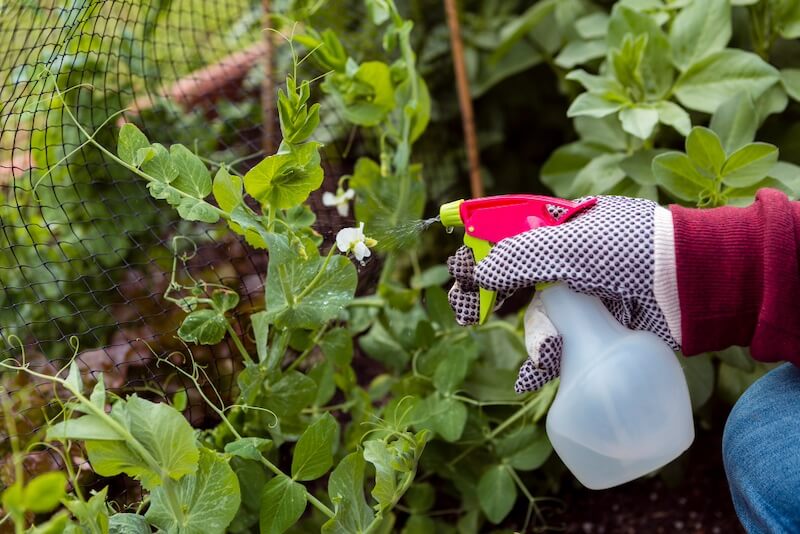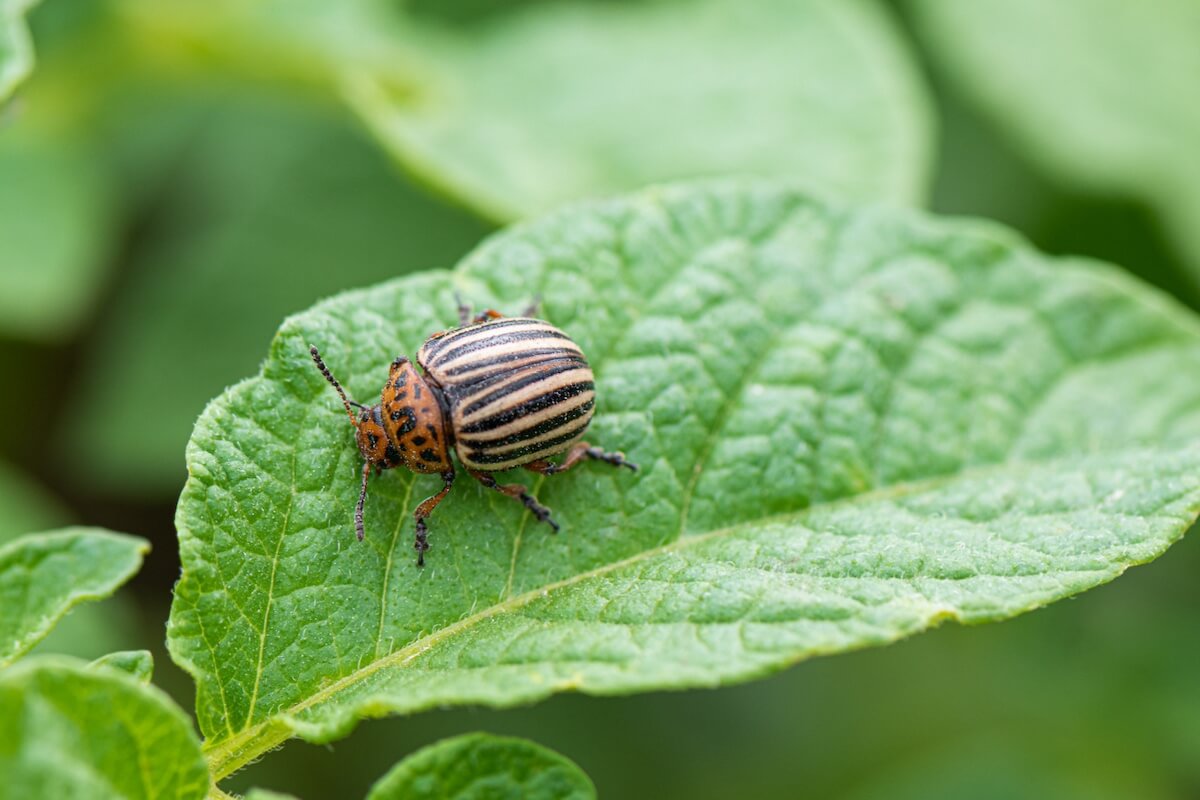Is your garden under siege from unwanted pests? You’re not alone! Many homeowners face the challenge of protecting their beloved plants from a variety of unwelcome critters, such as aphids, slugs, and snails, to name a few. No need to worry, though, because we’ve got you covered with a step-by-step guide to rid your home of garden pests effectively and safely.
First things first, it’s essential to understand that these garden pests come in different shapes and sizes. From insects to wildlife, your location plays a significant role in determining which pests might invade your garden. That’s why knowing your enemy is crucial for effective pest control. By being aware of which pests are most likely to wreak havoc in your garden, you can tailor your defence strategy accordingly.
Now that you’ve identified which pests are causing you trouble, it’s time to take action! Through a mix of prevention, organic solutions, and targeted treatments, you can protect your plants from these annoying intruders. Ready to get started on your pest-free journey? Keep on reading, and in no time, you’ll have a beautiful, healthy garden you can be proud of.
Understanding Garden Pests
Identifying Common Pests
It’s important for you to be able to identify the common garden pests that might invade your space. Do any of these sound familiar?
- Aphids: These tiny insects can cause quite a headache for gardeners. They often appear in large numbers and can cause damage by sucking the sap from your plants.
- Ants: While they might not directly harm your plants, ants have a symbiotic relationship with aphids, protecting them from predators and even “farming” them for their sweet honeydew secretions.
Here’s a quick list of other common garden pests:
- Slugs and snails
- Spider mites
- Caterpillars
- Whiteflies
- Beetles
You can start by closely examining your plants for any signs of these pests or their eggs. Prevention is key, and horticultural oil can be sprayed on dormant plants to kill eggs and prevent infestations.
The Impact of Pests on Your Garden
When pests attack your garden, they can cause severe damage and even disease. Here are some ways pests can harm your plants:
- Physical Damage: This includes eating leaves, flower buds, and distorting new growth. In severe cases, pests can even kill your plants.
- Transmitting Diseases: Some pests, like aphids, can transmit diseases between plants. This can lead to widespread issues in your garden, especially if left untreated.
- Unsightly Damage: Pests can also cause visual damage to your plants, such as wilting leaves, discoloured foliage, or irregular growth patterns.
Protecting your garden from these pests is crucial for maintaining a beautiful, healthy space. Remember that not all insects or wildlife in your garden are harmful – many actually contribute to a well-balanced ecosystem. By keeping an eye out for the common pests mentioned above and addressing issues early, you’ll be well on your way to a flourishing, pest-free garden.
Preventative Strategies
Cultural Controls
One of the most effective ways to prevent garden pests is through proper cultural practices. By optimising your plants’ growing environment, you can reduce their vulnerability to pests.
- Choose the right plants: Start by selecting plants suited for your region’s climatic conditions. Healthier plants are less likely to attract unwanted guests.
- Proper watering: Ensure appropriate water levels based on the plants’ needs. Over-watering can lead to root rot and pest infestations, so try to strike the right balance.
- Clean garden and tools: Keep your garden and equipment clean to avoid accidental transfer of pests between plants.
- Healthy soil: Using organic mulch helps retain moisture and prevent insects from laying their eggs on exposed soil.
Making these adjustments can go a long way toward preventing pests natural by promoting an overall healthy garden environment.

Physical Barriers
Physical barriers effectively keep pests at bay by blocking their access to your plants.
- Fences: Constructing simple fences around the garden can deter larger pests like rabbits and rodents.
- Row covers: Use these lightweight, breathable fabrics to protect delicate plants from insect pests.
- Greenhouse: Consider investing in a greenhouse to protect your plants from extreme weather conditions and unwanted critters.
Remember, implementing these barriers may take some effort, but they can save you a lot of frustration in the long run.
Biological Controls
Harnessing the power of predatory organisms can help control pests:
- Beneficial insects: Encourage the presence of natural predators like ladybirds and lacewings, which feed on common garden pests.
- Birds: Welcoming birds into your garden can significantly reduce active pest populations. Set up bird feeders to entice these natural pest controllers.
- Nematodes: These microscopic worms are effective against a range of harmful insects in the soil. Apply them to your garden during the cooler months, such as autumn, for the best results.
The combination of cultural controls, physical barriers, and biological controls in your garden will help create a robust integrated pest management strategy to prevent and control unwanted pests.
Organic and Chemical Pest Management
Using Organic Pesticides Effectively
When dealing with garden pests, you might be hesitant to introduce harsh chemicals into your environment. Luckily, there are organic options available! Diatomaceous earth is one such solution. This fine powder, made from crushed fossils, can be sprinkled onto leaves to deter insect pests. It works by damaging the waxy exoskeletons and dehydrating the pests, eventually killing them.
Another powerful organic pesticide is neem oil, derived from the neem tree. To use neem oil effectively, mix a few drops with water and a small amount of mild soap. Then, spray the mixture onto the affected plants. Not only does this natural compound deter pests, but it also helps control fungi and mould. Remember, always apply organic pesticides early in the morning or late evening to avoid harming beneficial insects.
Understanding Chemical Pesticides
Despite the effectiveness of organic pesticides, you might find yourself in a situation where chemical intervention is necessary. In such cases, it’s essential to understand these chemicals and use them responsibly.
Some common chemical pesticides include insecticides like carbamates and synthetic pyrethroids. These chemicals target the insect pests’ nervous systems leading to their death. To minimise environmental impact, follow the product’s label instructions and use the minimal effective dose.
Another popular chemical solution comes in the form of nematodes. These microscopic worms are a great solution for soil-dwelling pests like grubs and slugs. Simply mix the nematodes with water and spread them across the affected area. They’ll work by invading the pests and releasing bacteria, which ultimately kills the host.
Remember, always wear appropriate protective equipment and try organic methods before resorting to chemicals. Be aware of the long-term effects and use chemical pesticides as a last resort. Happy gardening!
Routine Inspection and Maintenance
Monitoring Plant Health
Routinely inspecting your plants and their leaves is crucial for healthy garden maintenance. Keep an eye out for discolouration, wilting, or unusual growth patterns in your plants. These signs may indicate the presence of pests or diseases.
To maintain your garden’s health, consider the following:
- Observe the foliage on your plants. Both indoor and outdoor plants benefit from periodic checks.
- Don’t forget to monitor plants in your greenhouses, as this environment can harbour pests.
- Regularly check your plants for signs of infestations. Early detection can prevent bigger problems.
Ensuring proper moisture levels in your garden is also essential for healthy growth. Different plants have varying moisture requirements, so be sure to water according to their needs.
Regular Garden Upkeep
Keeping your garden clean and well-maintained helps minimise pest problems. Here are a few strategies to keep your garden green and pest-free:
- Remove dead leaves and debris: Clearing away dead plant material helps prevent pests from finding shelter and breeding grounds.
- Prune overgrown plants: Proper pruning can ensure better air circulation and limit hiding spots for pests.
- Weed regularly: Weeds compete with your plants for nutrients and may harbour pests.
- Plant a diverse range of plants: Cultivating a vibrant mix of plant species can encourage beneficial insects and natural predators of garden pests.
- Use organic pest control methods: Utilising natural remedies, such as beneficial insects or homemade sprays, can deter pests without harming your plants.
By performing these routine inspection and maintenance tasks, you can encourage a healthier, pest-free garden for you and your plants to enjoy. Remember that prevention and early detection are key in keeping garden pests at bay.
Frequently Asked Questions
What natural remedies can I use to deter insects from my garden without harming the plants?
You can use a variety of natural remedies to deter pests from your garden without damaging your plants. Some effective options include:
- Neem oil: This natural oil extracted from the neem tree is a safe and effective option for controlling various insects such as aphids, beetles, and whiteflies.
- Diatomaceous earth: This is a natural soil additive made from the remains of diatoms, which are microscopic algae. Sprinkling it on the plants and soil can help control pests like slugs, snails, and ants.
- Garlic and chilli sprays: Mix crushed garlic or chilli peppers with water and a drop of dish soap to create a homemade spray that deters many insects.
- Insecticidal soap: Mix a mild soap with water and spray it directly onto pests to kill them and deter others from coming.
Remember to test these remedies on a small section of your garden first to ensure they don’t have adverse effects on your plants.
Can you recommend any plants that naturally repel pests in a vegetable garden?
Certain plants have aromas and properties that discourage pests, making them excellent companion plants for your vegetable garden. Some examples include:
- Marigolds: These colourful flowers emit a scent that repels pests like aphids and tomato hornworms.
- Lavender: This fragrant plant is known to deter mosquitoes, flies, and moths, making it an ideal choice for a pest-free garden.
- Calendula: This plant attracts beneficial insects while repelling unwanted ones like whiteflies and thrips.
- Basil: Planting basil near your tomatoes can help to repel flies and mosquitoes, while also enhancing the flavour of your tomatoes.
These plants not only protect your vegetable garden from pests but also add beauty and diversity to your garden.
Where can I find local experts for garden pest control advice?
To find local experts for garden pest control advice, consider the following options:
- Local garden centres: Many garden centres have experienced staff who can provide guidance on pest control methods and products. They can also help you identify specific pests and recommend appropriate solutions.
- Gardening clubs or societies: Joining a local gardening club or society can connect you with experienced gardeners who can offer personalized advice based on their own experiences.
- Extension offices or agricultural organisations: Check for nearby extension offices or agricultural organisations that may offer information, workshops, or expert advice on pest control.
- Online gardening forums and communities: Join online gardening forums or social media groups where members discuss their experiences and share advice on various gardening topics, including pest control.
- Local Pest control companies in London may offer you free advice when dealing with Rats, Mice, Foxes etc
By reaching out to these resources, you can get the guidance and information you need to keep your garden pest-free.
